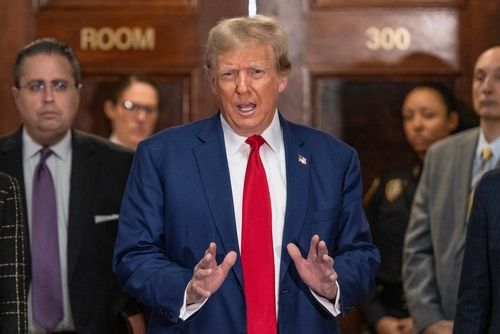Swiss exports crash 36% in the first month of Trump tariffs
- Bitcoin Drops to $70,000. U.S. Government Refuses to Bail Out Market, End of Bull Market or Golden Pit?
- Gold rallies further beyond $5,050 amid flight to safety, dovish Fed expectations
- Bitcoin Bottom Debate: $70,000 or $50,000?
- A Crash After a Surge: Why Silver Lost 40% in a Week?
- Bitcoin Slips Below 75,000 Mark. Will Strategy Change Its Mind and Sell?
- Bitcoin Rout. Bridgewater Founder Dalio Publicly Backs Gold.

Swiss exports to the US dropped sharply in April, highlighting the effects of President Donald Trump’s tariff policy.
Foreign sales, adjusted for seasonal changes, fell by 36% compared to March. Imports from the US also decreased by 15%, according to a statement from the customs office in Bern.
Switzerland seeks a trade agreement with the US
Switzerland’s overall trade figures showed a decline in exports and imports, resulting in a record trade surplus of 6.3 billion Swiss francs worth $7.7 billion.
According to US Treasury Secretary Scott Bessent, Switzerland had taken the lead in seeking a trade agreement with the United States. Bessent revealed this after the Alpine nation hosted the US-China trade discussions over the weekend.
Before the talks with the two countries, Swiss officials met with Bessent, his team, and Chinese Vice Premier He Lifeng to discuss Switzerland’s trade issues with the US.
These concerns were raised after the United States imposed a 31% tariff on Switzerland, while it set tariffs of 20% on the European Union and 10% on Britain. This decision surprised Swiss officials, and since then, major Swiss companies have committed to investing significantly in the US. It is worth noting that Trump later suspended many global tariffs, lowering them to a standard rate of 10%.
Following Switzerland’s extensive talk on Trump’s tariffs, Bessent noted that the UK and Switzerland had moved to the front of the line for trade deals, but the EU has been much slower. During a press conference in Geneva, he commented about Switzerland’s role as a go-between, especially as its neutrality appears to be changing and Gulf countries are becoming more active.
The reason for the EU being slower in reaching a trade deal was that the EU had indicated that it would not agree to an unfair deal on US tariffs and has suggested possible counteractions. Last week, Britain quickly finalized a trade agreement with US President Donald Trump’s administration, but it is limited in scope.
On the other hand, Switzerland long aimed to be a mediator during global crises, and analysts noted that it made a special effort this time. They highlighted the choice of location for the negotiations, which took place at the private home of Switzerland’s UN ambassador.
Switzerland seeks closer ties with the EU as Trump’s tariff becomes more uncertain
US President Donald Trump’s choice to impose higher tariffs on Switzerland than on most European countries shocked the export-driven nation, leading it to seek closer ties with the European Union as it worked to manage the consequences.
In December, Switzerland took a first step toward deeper economic ties by reaching a political agreement with Brussels to improve their trading relationship. Though this EU agreement needed to go through a lengthy approval process, Swiss President and Finance Minister Karin Keller-Sutter highlighted it in an interview as she evaluated Switzerland’s options after the US trade decision.
In the Neue Zuercher Zeitung, Keller-Sutter Highlighted the urgency of the relationship, revealing that they wanted to stabilize and deepen relations with the EU.
One of the reasons behind the urgency for this relationship was that Neutral Switzerland had built a successful, open economy based on a low-tax business model and direct democracy, making it wealthier than almost all EU member states. This success fostered national pride and resistance to becoming part of the EU.
After the tariffs were imposed, Keller-Sutter quickly contacted EU Commission President Ursula von der Leyen and agreed to keep close communication.
Read more
* The content presented above, whether from a third party or not, is considered as general advice only. This article should not be construed as containing investment advice, investment recommendations, an offer of or solicitation for any transactions in financial instruments.





